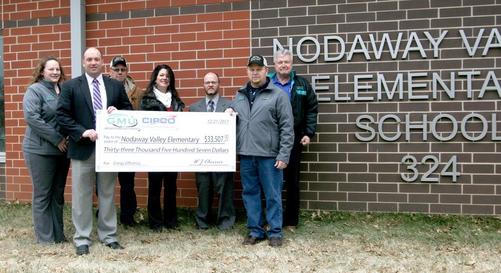“In a rapidly changing energy market, implementing energy efficiency programs provide significant benefits and cost-savings,” indicated Scott Tonderum, GMU General Manager. “Additionally, geothermal provides an environmentally-friendly heating and cooling option for the benefit of the community.”
The elementary school building is heated and cooled with a highly-efficient 112-ton geothermal system. The kitchen includes energy-efficient equipment and LED lighting throughout. Project architect, Jerry Purdy, president and founder of Design Alliance, provided the school with energy analysis on three types of heating and cooling systems. School district leaders chose the geothermal system for its efficiency and reasonable payback period.
Jeremy Lang, director of the Iowa Geothermal Association, said modern geothermal systems are far and away the most superior method of saving energy when compared to “old school” boilers and a chiller/cooling tower.
“Geothermal can provide heating and cooling with or without burning fossil fuels, but while fossil fuel systems are limited to efficiencies under 100 percent, geothermal systems can achieve an efficiency range of 300 to 500 percent,” Lang said.
Greenfield Municipal Utilities and CIPCO offer energy-efficiency incentives for residential, commercial and agriculture projects that occur within their service territories.
About Greenfield Municipal Utilities
Greenfield Municipal Utilities, a member of SIMECA (Southern Iowa Municipal Electric Cooperative Association), provides electricity and water to approximately 2,000 citizens in the city of Greenfield. They offer a full suite of incentives for commercial and residential energy efficient products. Visit www.gmu-ia.com for more information.
About CIPCO
Central Iowa Power Cooperative is a member-owned, not-for-profit, generation and transmission (G&T) cooperative serving 13 rural electric cooperatives and associations, which includes SIMECA. As Iowa’s largest cooperative energy provider, CIPCO serves approximately 316,500 Iowans in 58 counties. For more information, visit www.cipco.net.


 RSS Feed
RSS Feed
